A Critical Analysis of Ethical and Moral Issues in Health Care
VerifiedAdded on 2023/04/10
|8
|1807
|59
Essay
AI Summary
This essay provides a critical analysis of the ethical and moral issues present in a healthcare case study, focusing on a patient's refusal of treatment following medical negligence. The analysis identifies key agents, including the patient (Mrs. Francois), her family, and healthcare professionals, and examines their responses through the lens of ethical theories such as consequentialism, deontology, and utilitarianism. The essay highlights conflicts between patient autonomy, beneficence, and non-maleficence, and explores potential resolutions, emphasizing the importance of accountability, compassion, and effective communication by healthcare providers. The author suggests that while family concern is justified, threatening behavior is not, and the overall approach should prioritize beneficence while respecting patient dignity. Desklib offers a wide range of academic resources, including similar essays and study tools, to support students in their learning journey.
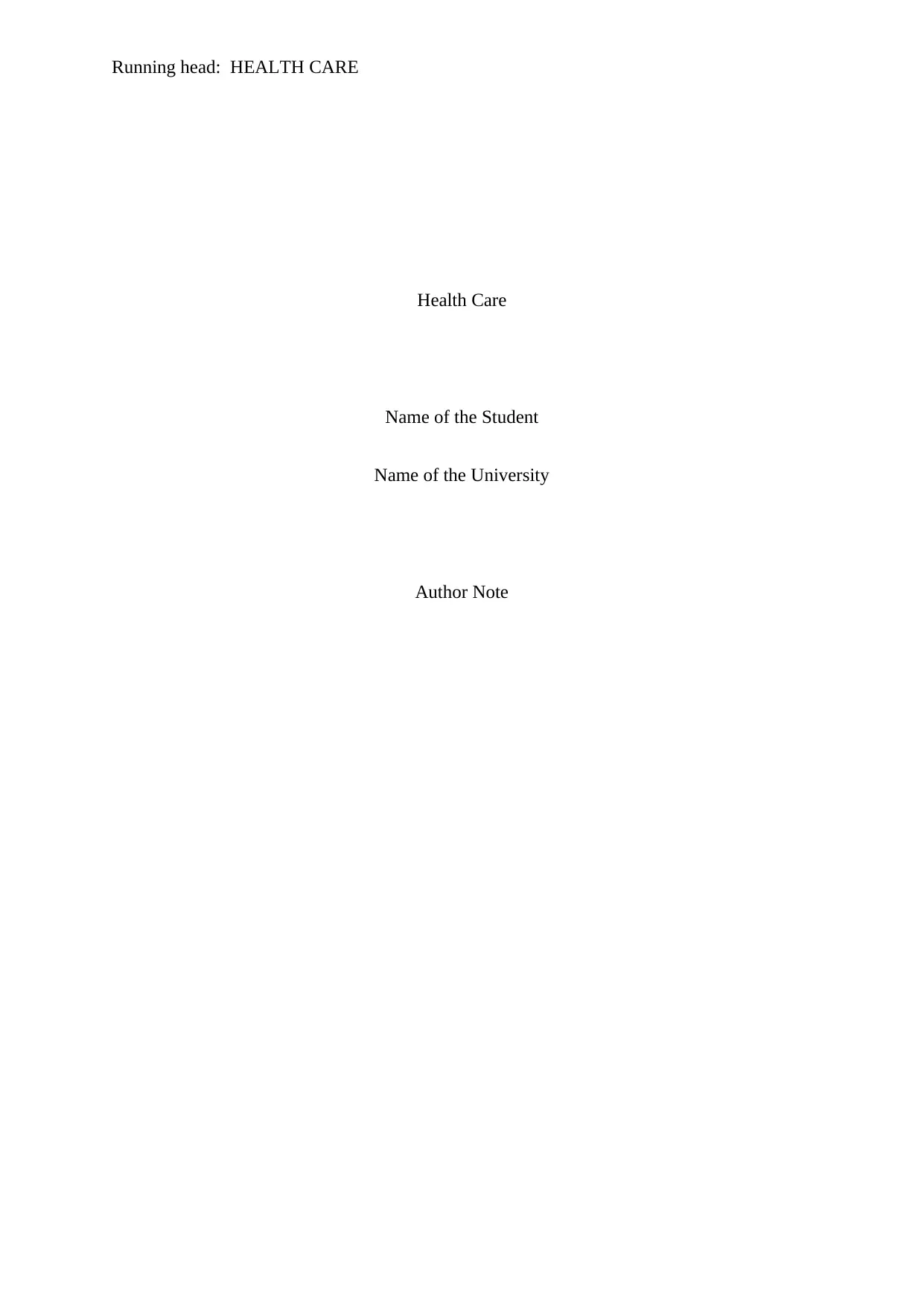
Running head: HEALTH CARE
Health Care
Name of the Student
Name of the University
Author Note
Health Care
Name of the Student
Name of the University
Author Note
Paraphrase This Document
Need a fresh take? Get an instant paraphrase of this document with our AI Paraphraser
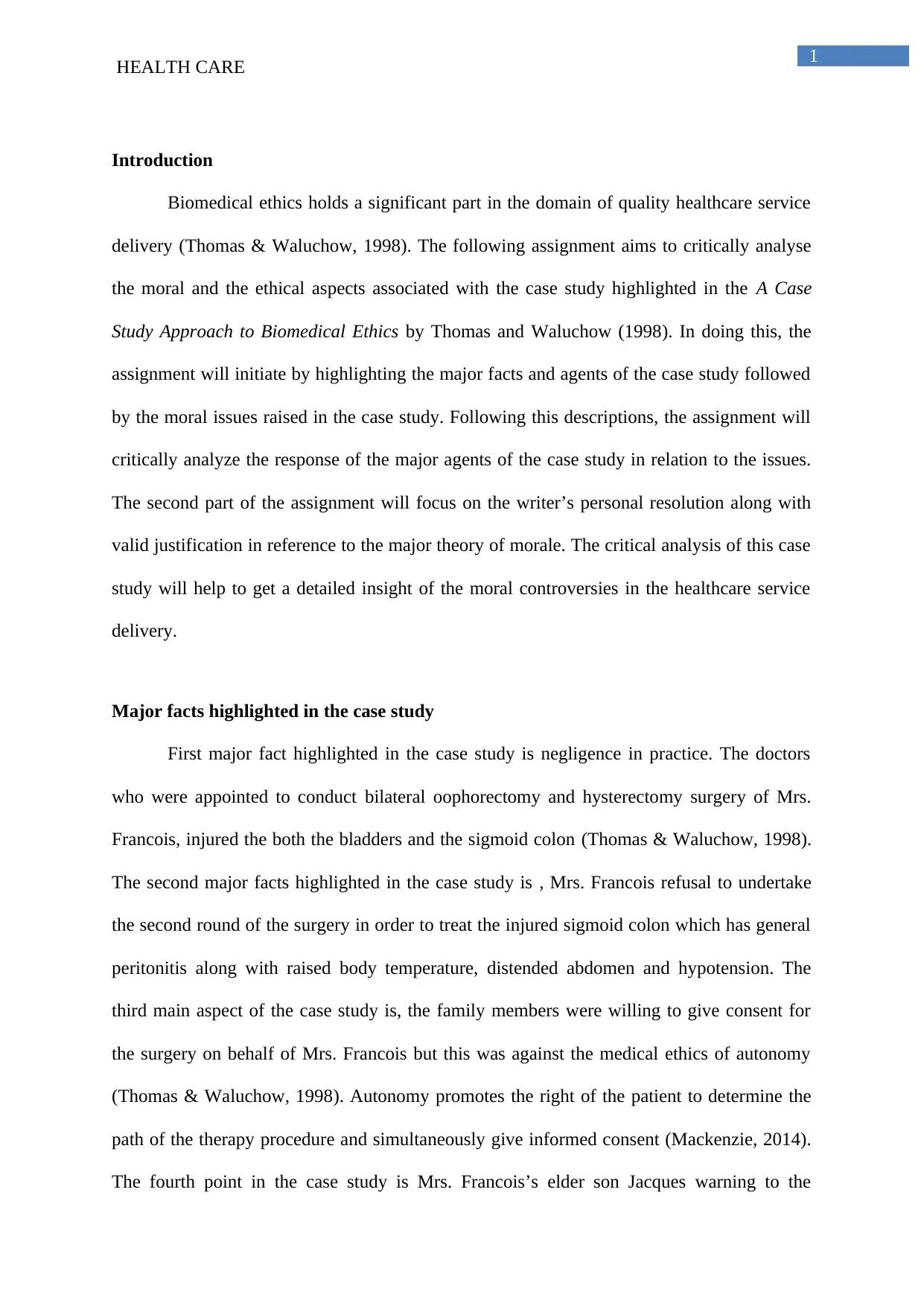
1
HEALTH CARE
Introduction
Biomedical ethics holds a significant part in the domain of quality healthcare service
delivery (Thomas & Waluchow, 1998). The following assignment aims to critically analyse
the moral and the ethical aspects associated with the case study highlighted in the A Case
Study Approach to Biomedical Ethics by Thomas and Waluchow (1998). In doing this, the
assignment will initiate by highlighting the major facts and agents of the case study followed
by the moral issues raised in the case study. Following this descriptions, the assignment will
critically analyze the response of the major agents of the case study in relation to the issues.
The second part of the assignment will focus on the writer’s personal resolution along with
valid justification in reference to the major theory of morale. The critical analysis of this case
study will help to get a detailed insight of the moral controversies in the healthcare service
delivery.
Major facts highlighted in the case study
First major fact highlighted in the case study is negligence in practice. The doctors
who were appointed to conduct bilateral oophorectomy and hysterectomy surgery of Mrs.
Francois, injured the both the bladders and the sigmoid colon (Thomas & Waluchow, 1998).
The second major facts highlighted in the case study is , Mrs. Francois refusal to undertake
the second round of the surgery in order to treat the injured sigmoid colon which has general
peritonitis along with raised body temperature, distended abdomen and hypotension. The
third main aspect of the case study is, the family members were willing to give consent for
the surgery on behalf of Mrs. Francois but this was against the medical ethics of autonomy
(Thomas & Waluchow, 1998). Autonomy promotes the right of the patient to determine the
path of the therapy procedure and simultaneously give informed consent (Mackenzie, 2014).
The fourth point in the case study is Mrs. Francois’s elder son Jacques warning to the
HEALTH CARE
Introduction
Biomedical ethics holds a significant part in the domain of quality healthcare service
delivery (Thomas & Waluchow, 1998). The following assignment aims to critically analyse
the moral and the ethical aspects associated with the case study highlighted in the A Case
Study Approach to Biomedical Ethics by Thomas and Waluchow (1998). In doing this, the
assignment will initiate by highlighting the major facts and agents of the case study followed
by the moral issues raised in the case study. Following this descriptions, the assignment will
critically analyze the response of the major agents of the case study in relation to the issues.
The second part of the assignment will focus on the writer’s personal resolution along with
valid justification in reference to the major theory of morale. The critical analysis of this case
study will help to get a detailed insight of the moral controversies in the healthcare service
delivery.
Major facts highlighted in the case study
First major fact highlighted in the case study is negligence in practice. The doctors
who were appointed to conduct bilateral oophorectomy and hysterectomy surgery of Mrs.
Francois, injured the both the bladders and the sigmoid colon (Thomas & Waluchow, 1998).
The second major facts highlighted in the case study is , Mrs. Francois refusal to undertake
the second round of the surgery in order to treat the injured sigmoid colon which has general
peritonitis along with raised body temperature, distended abdomen and hypotension. The
third main aspect of the case study is, the family members were willing to give consent for
the surgery on behalf of Mrs. Francois but this was against the medical ethics of autonomy
(Thomas & Waluchow, 1998). Autonomy promotes the right of the patient to determine the
path of the therapy procedure and simultaneously give informed consent (Mackenzie, 2014).
The fourth point in the case study is Mrs. Francois’s elder son Jacques warning to the
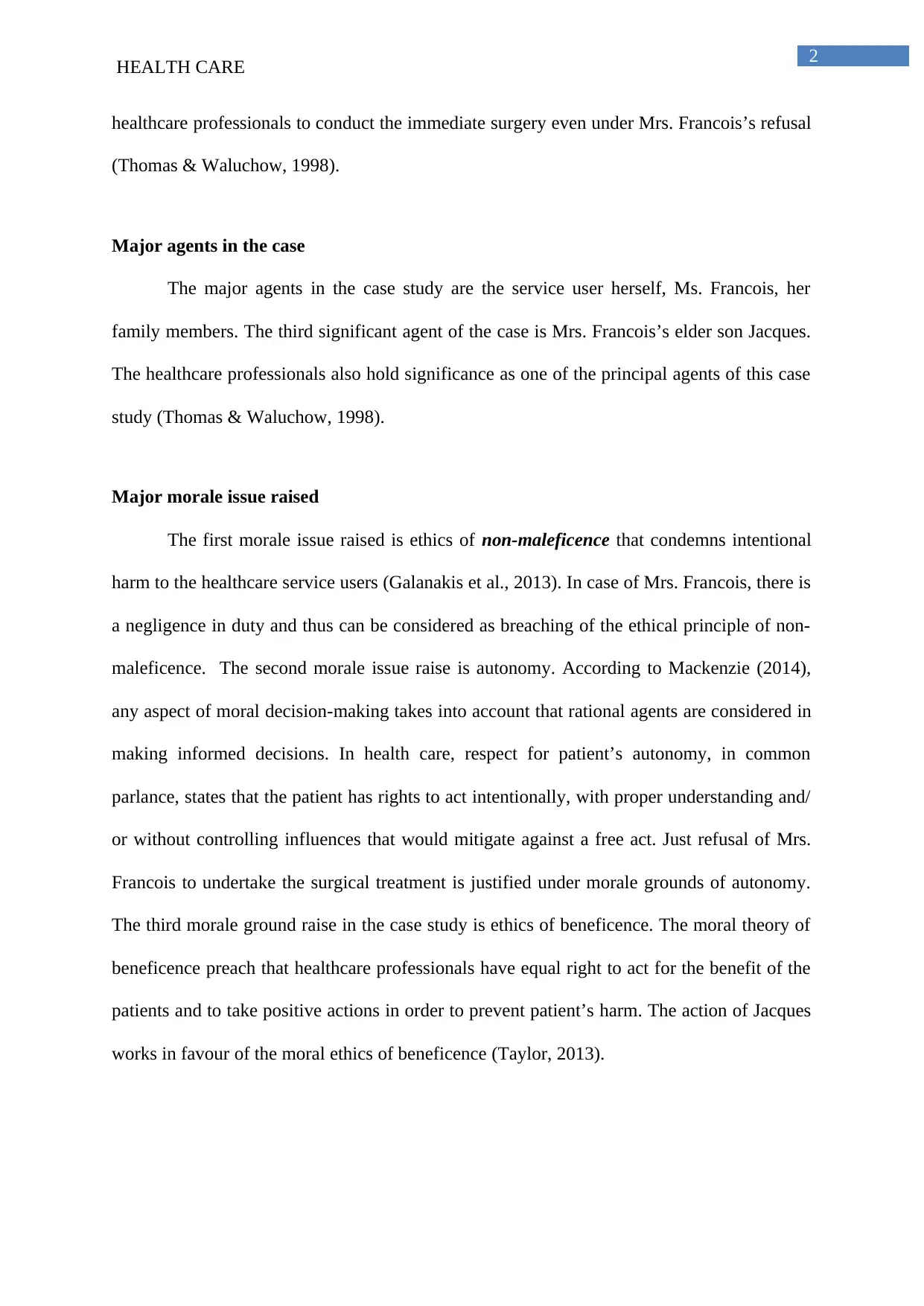
2
HEALTH CARE
healthcare professionals to conduct the immediate surgery even under Mrs. Francois’s refusal
(Thomas & Waluchow, 1998).
Major agents in the case
The major agents in the case study are the service user herself, Ms. Francois, her
family members. The third significant agent of the case is Mrs. Francois’s elder son Jacques.
The healthcare professionals also hold significance as one of the principal agents of this case
study (Thomas & Waluchow, 1998).
Major morale issue raised
The first morale issue raised is ethics of non-maleficence that condemns intentional
harm to the healthcare service users (Galanakis et al., 2013). In case of Mrs. Francois, there is
a negligence in duty and thus can be considered as breaching of the ethical principle of non-
maleficence. The second morale issue raise is autonomy. According to Mackenzie (2014),
any aspect of moral decision-making takes into account that rational agents are considered in
making informed decisions. In health care, respect for patient’s autonomy, in common
parlance, states that the patient has rights to act intentionally, with proper understanding and/
or without controlling influences that would mitigate against a free act. Just refusal of Mrs.
Francois to undertake the surgical treatment is justified under morale grounds of autonomy.
The third morale ground raise in the case study is ethics of beneficence. The moral theory of
beneficence preach that healthcare professionals have equal right to act for the benefit of the
patients and to take positive actions in order to prevent patient’s harm. The action of Jacques
works in favour of the moral ethics of beneficence (Taylor, 2013).
HEALTH CARE
healthcare professionals to conduct the immediate surgery even under Mrs. Francois’s refusal
(Thomas & Waluchow, 1998).
Major agents in the case
The major agents in the case study are the service user herself, Ms. Francois, her
family members. The third significant agent of the case is Mrs. Francois’s elder son Jacques.
The healthcare professionals also hold significance as one of the principal agents of this case
study (Thomas & Waluchow, 1998).
Major morale issue raised
The first morale issue raised is ethics of non-maleficence that condemns intentional
harm to the healthcare service users (Galanakis et al., 2013). In case of Mrs. Francois, there is
a negligence in duty and thus can be considered as breaching of the ethical principle of non-
maleficence. The second morale issue raise is autonomy. According to Mackenzie (2014),
any aspect of moral decision-making takes into account that rational agents are considered in
making informed decisions. In health care, respect for patient’s autonomy, in common
parlance, states that the patient has rights to act intentionally, with proper understanding and/
or without controlling influences that would mitigate against a free act. Just refusal of Mrs.
Francois to undertake the surgical treatment is justified under morale grounds of autonomy.
The third morale ground raise in the case study is ethics of beneficence. The moral theory of
beneficence preach that healthcare professionals have equal right to act for the benefit of the
patients and to take positive actions in order to prevent patient’s harm. The action of Jacques
works in favour of the moral ethics of beneficence (Taylor, 2013).
⊘ This is a preview!⊘
Do you want full access?
Subscribe today to unlock all pages.

Trusted by 1+ million students worldwide
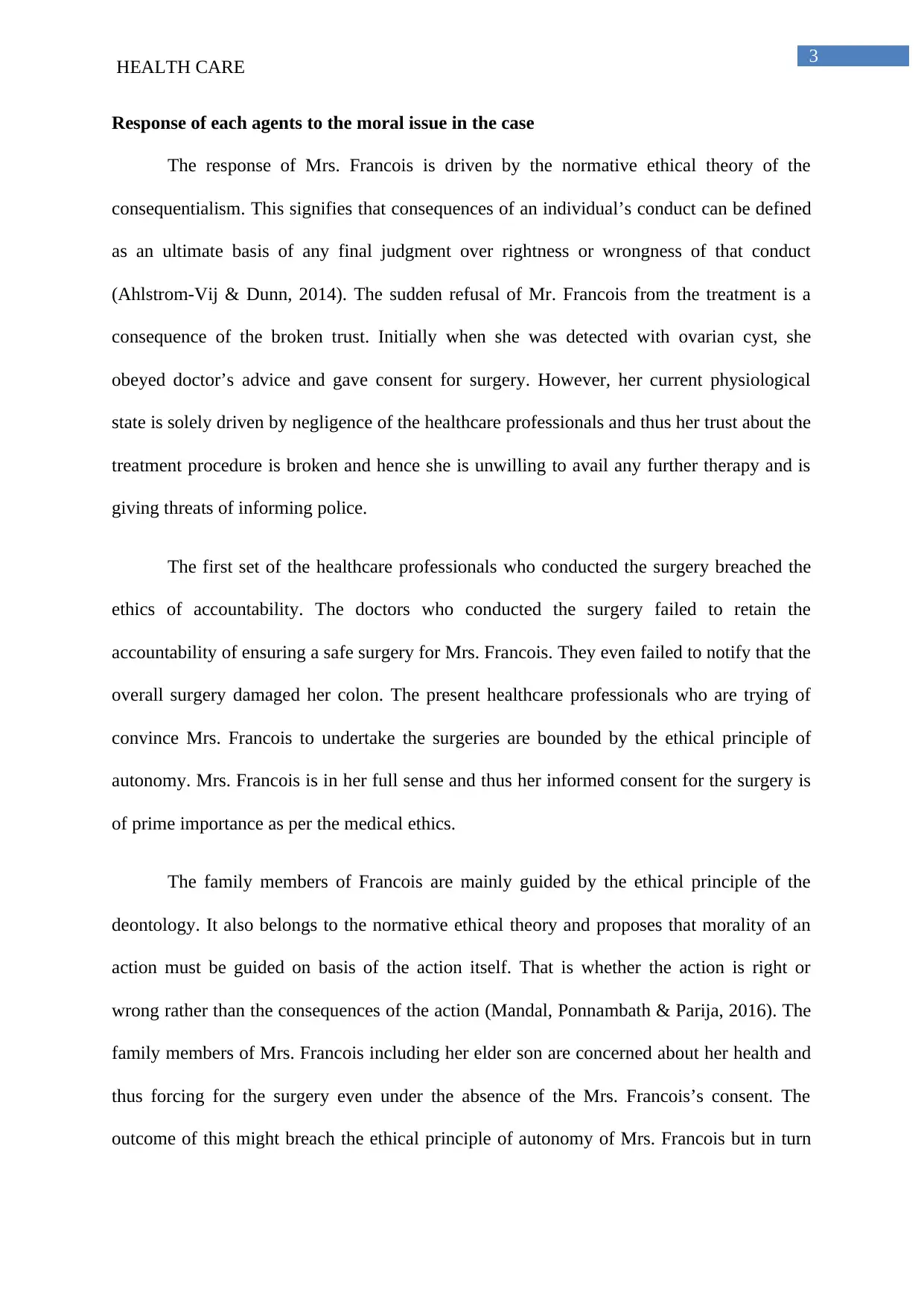
3
HEALTH CARE
Response of each agents to the moral issue in the case
The response of Mrs. Francois is driven by the normative ethical theory of the
consequentialism. This signifies that consequences of an individual’s conduct can be defined
as an ultimate basis of any final judgment over rightness or wrongness of that conduct
(Ahlstrom-Vij & Dunn, 2014). The sudden refusal of Mr. Francois from the treatment is a
consequence of the broken trust. Initially when she was detected with ovarian cyst, she
obeyed doctor’s advice and gave consent for surgery. However, her current physiological
state is solely driven by negligence of the healthcare professionals and thus her trust about the
treatment procedure is broken and hence she is unwilling to avail any further therapy and is
giving threats of informing police.
The first set of the healthcare professionals who conducted the surgery breached the
ethics of accountability. The doctors who conducted the surgery failed to retain the
accountability of ensuring a safe surgery for Mrs. Francois. They even failed to notify that the
overall surgery damaged her colon. The present healthcare professionals who are trying of
convince Mrs. Francois to undertake the surgeries are bounded by the ethical principle of
autonomy. Mrs. Francois is in her full sense and thus her informed consent for the surgery is
of prime importance as per the medical ethics.
The family members of Francois are mainly guided by the ethical principle of the
deontology. It also belongs to the normative ethical theory and proposes that morality of an
action must be guided on basis of the action itself. That is whether the action is right or
wrong rather than the consequences of the action (Mandal, Ponnambath & Parija, 2016). The
family members of Mrs. Francois including her elder son are concerned about her health and
thus forcing for the surgery even under the absence of the Mrs. Francois’s consent. The
outcome of this might breach the ethical principle of autonomy of Mrs. Francois but in turn
HEALTH CARE
Response of each agents to the moral issue in the case
The response of Mrs. Francois is driven by the normative ethical theory of the
consequentialism. This signifies that consequences of an individual’s conduct can be defined
as an ultimate basis of any final judgment over rightness or wrongness of that conduct
(Ahlstrom-Vij & Dunn, 2014). The sudden refusal of Mr. Francois from the treatment is a
consequence of the broken trust. Initially when she was detected with ovarian cyst, she
obeyed doctor’s advice and gave consent for surgery. However, her current physiological
state is solely driven by negligence of the healthcare professionals and thus her trust about the
treatment procedure is broken and hence she is unwilling to avail any further therapy and is
giving threats of informing police.
The first set of the healthcare professionals who conducted the surgery breached the
ethics of accountability. The doctors who conducted the surgery failed to retain the
accountability of ensuring a safe surgery for Mrs. Francois. They even failed to notify that the
overall surgery damaged her colon. The present healthcare professionals who are trying of
convince Mrs. Francois to undertake the surgeries are bounded by the ethical principle of
autonomy. Mrs. Francois is in her full sense and thus her informed consent for the surgery is
of prime importance as per the medical ethics.
The family members of Francois are mainly guided by the ethical principle of the
deontology. It also belongs to the normative ethical theory and proposes that morality of an
action must be guided on basis of the action itself. That is whether the action is right or
wrong rather than the consequences of the action (Mandal, Ponnambath & Parija, 2016). The
family members of Mrs. Francois including her elder son are concerned about her health and
thus forcing for the surgery even under the absence of the Mrs. Francois’s consent. The
outcome of this might breach the ethical principle of autonomy of Mrs. Francois but in turn
Paraphrase This Document
Need a fresh take? Get an instant paraphrase of this document with our AI Paraphraser
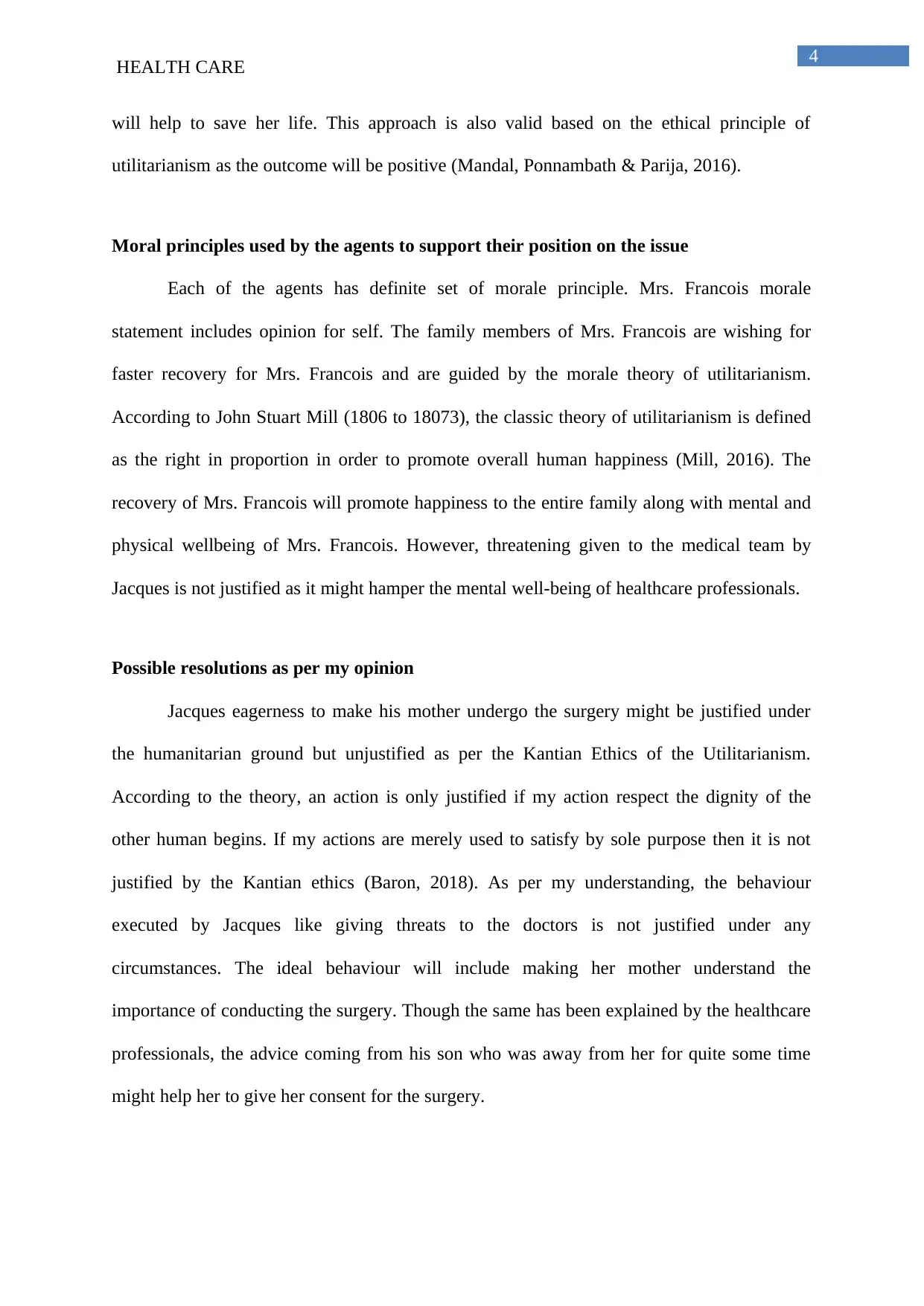
4
HEALTH CARE
will help to save her life. This approach is also valid based on the ethical principle of
utilitarianism as the outcome will be positive (Mandal, Ponnambath & Parija, 2016).
Moral principles used by the agents to support their position on the issue
Each of the agents has definite set of morale principle. Mrs. Francois morale
statement includes opinion for self. The family members of Mrs. Francois are wishing for
faster recovery for Mrs. Francois and are guided by the morale theory of utilitarianism.
According to John Stuart Mill (1806 to 18073), the classic theory of utilitarianism is defined
as the right in proportion in order to promote overall human happiness (Mill, 2016). The
recovery of Mrs. Francois will promote happiness to the entire family along with mental and
physical wellbeing of Mrs. Francois. However, threatening given to the medical team by
Jacques is not justified as it might hamper the mental well-being of healthcare professionals.
Possible resolutions as per my opinion
Jacques eagerness to make his mother undergo the surgery might be justified under
the humanitarian ground but unjustified as per the Kantian Ethics of the Utilitarianism.
According to the theory, an action is only justified if my action respect the dignity of the
other human begins. If my actions are merely used to satisfy by sole purpose then it is not
justified by the Kantian ethics (Baron, 2018). As per my understanding, the behaviour
executed by Jacques like giving threats to the doctors is not justified under any
circumstances. The ideal behaviour will include making her mother understand the
importance of conducting the surgery. Though the same has been explained by the healthcare
professionals, the advice coming from his son who was away from her for quite some time
might help her to give her consent for the surgery.
HEALTH CARE
will help to save her life. This approach is also valid based on the ethical principle of
utilitarianism as the outcome will be positive (Mandal, Ponnambath & Parija, 2016).
Moral principles used by the agents to support their position on the issue
Each of the agents has definite set of morale principle. Mrs. Francois morale
statement includes opinion for self. The family members of Mrs. Francois are wishing for
faster recovery for Mrs. Francois and are guided by the morale theory of utilitarianism.
According to John Stuart Mill (1806 to 18073), the classic theory of utilitarianism is defined
as the right in proportion in order to promote overall human happiness (Mill, 2016). The
recovery of Mrs. Francois will promote happiness to the entire family along with mental and
physical wellbeing of Mrs. Francois. However, threatening given to the medical team by
Jacques is not justified as it might hamper the mental well-being of healthcare professionals.
Possible resolutions as per my opinion
Jacques eagerness to make his mother undergo the surgery might be justified under
the humanitarian ground but unjustified as per the Kantian Ethics of the Utilitarianism.
According to the theory, an action is only justified if my action respect the dignity of the
other human begins. If my actions are merely used to satisfy by sole purpose then it is not
justified by the Kantian ethics (Baron, 2018). As per my understanding, the behaviour
executed by Jacques like giving threats to the doctors is not justified under any
circumstances. The ideal behaviour will include making her mother understand the
importance of conducting the surgery. Though the same has been explained by the healthcare
professionals, the advice coming from his son who was away from her for quite some time
might help her to give her consent for the surgery.
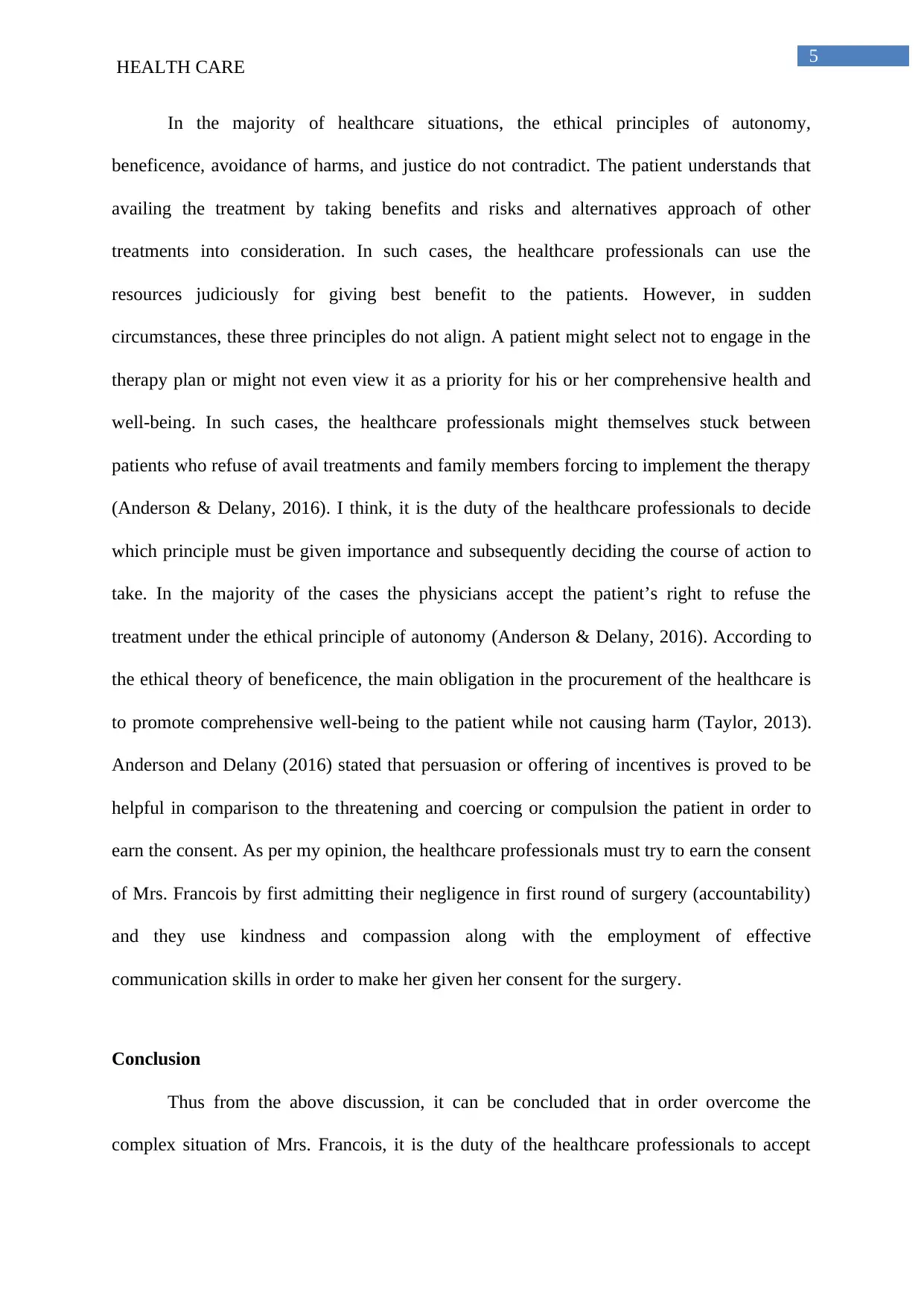
5
HEALTH CARE
In the majority of healthcare situations, the ethical principles of autonomy,
beneficence, avoidance of harms, and justice do not contradict. The patient understands that
availing the treatment by taking benefits and risks and alternatives approach of other
treatments into consideration. In such cases, the healthcare professionals can use the
resources judiciously for giving best benefit to the patients. However, in sudden
circumstances, these three principles do not align. A patient might select not to engage in the
therapy plan or might not even view it as a priority for his or her comprehensive health and
well-being. In such cases, the healthcare professionals might themselves stuck between
patients who refuse of avail treatments and family members forcing to implement the therapy
(Anderson & Delany, 2016). I think, it is the duty of the healthcare professionals to decide
which principle must be given importance and subsequently deciding the course of action to
take. In the majority of the cases the physicians accept the patient’s right to refuse the
treatment under the ethical principle of autonomy (Anderson & Delany, 2016). According to
the ethical theory of beneficence, the main obligation in the procurement of the healthcare is
to promote comprehensive well-being to the patient while not causing harm (Taylor, 2013).
Anderson and Delany (2016) stated that persuasion or offering of incentives is proved to be
helpful in comparison to the threatening and coercing or compulsion the patient in order to
earn the consent. As per my opinion, the healthcare professionals must try to earn the consent
of Mrs. Francois by first admitting their negligence in first round of surgery (accountability)
and they use kindness and compassion along with the employment of effective
communication skills in order to make her given her consent for the surgery.
Conclusion
Thus from the above discussion, it can be concluded that in order overcome the
complex situation of Mrs. Francois, it is the duty of the healthcare professionals to accept
HEALTH CARE
In the majority of healthcare situations, the ethical principles of autonomy,
beneficence, avoidance of harms, and justice do not contradict. The patient understands that
availing the treatment by taking benefits and risks and alternatives approach of other
treatments into consideration. In such cases, the healthcare professionals can use the
resources judiciously for giving best benefit to the patients. However, in sudden
circumstances, these three principles do not align. A patient might select not to engage in the
therapy plan or might not even view it as a priority for his or her comprehensive health and
well-being. In such cases, the healthcare professionals might themselves stuck between
patients who refuse of avail treatments and family members forcing to implement the therapy
(Anderson & Delany, 2016). I think, it is the duty of the healthcare professionals to decide
which principle must be given importance and subsequently deciding the course of action to
take. In the majority of the cases the physicians accept the patient’s right to refuse the
treatment under the ethical principle of autonomy (Anderson & Delany, 2016). According to
the ethical theory of beneficence, the main obligation in the procurement of the healthcare is
to promote comprehensive well-being to the patient while not causing harm (Taylor, 2013).
Anderson and Delany (2016) stated that persuasion or offering of incentives is proved to be
helpful in comparison to the threatening and coercing or compulsion the patient in order to
earn the consent. As per my opinion, the healthcare professionals must try to earn the consent
of Mrs. Francois by first admitting their negligence in first round of surgery (accountability)
and they use kindness and compassion along with the employment of effective
communication skills in order to make her given her consent for the surgery.
Conclusion
Thus from the above discussion, it can be concluded that in order overcome the
complex situation of Mrs. Francois, it is the duty of the healthcare professionals to accept
⊘ This is a preview!⊘
Do you want full access?
Subscribe today to unlock all pages.

Trusted by 1+ million students worldwide
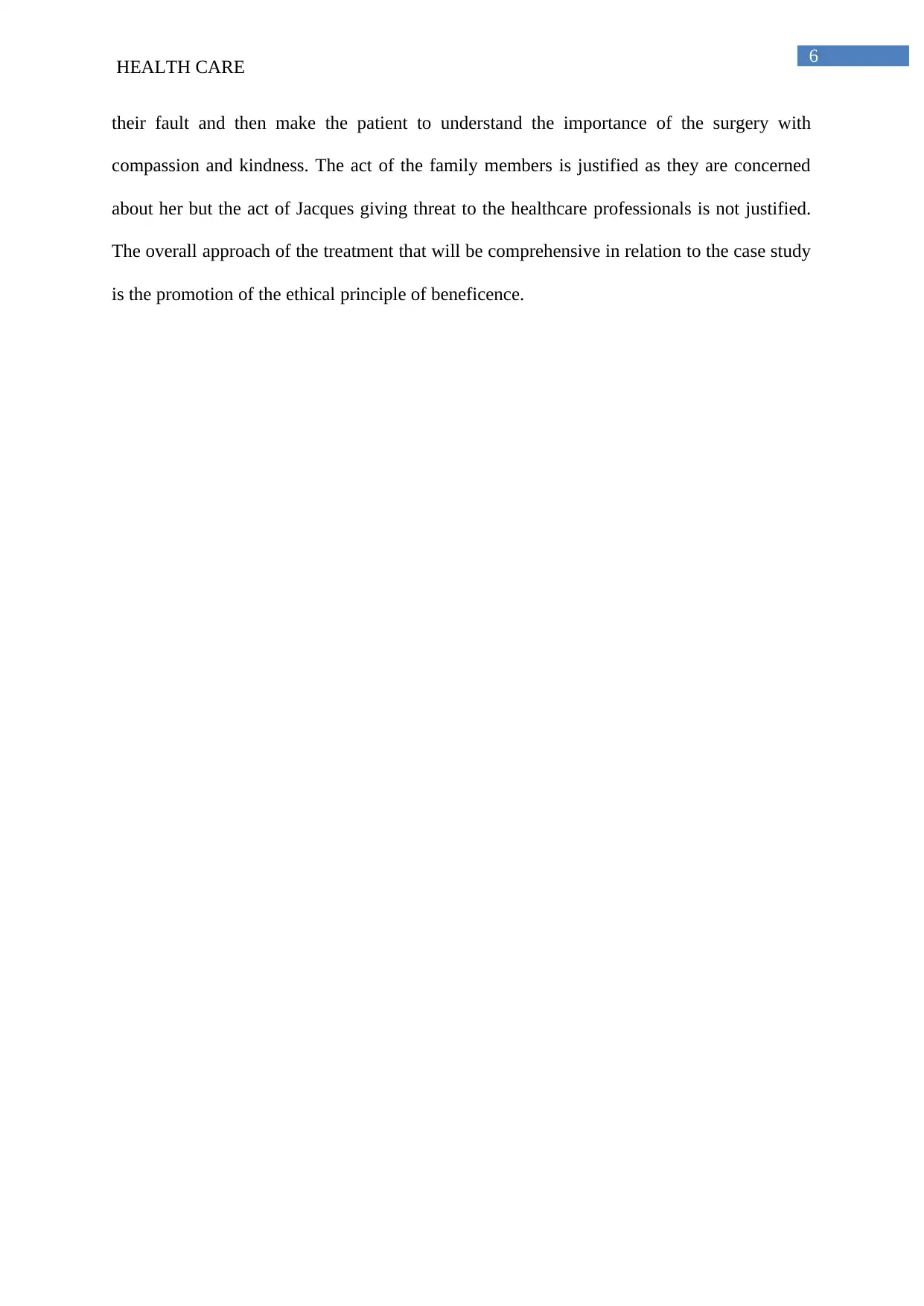
6
HEALTH CARE
their fault and then make the patient to understand the importance of the surgery with
compassion and kindness. The act of the family members is justified as they are concerned
about her but the act of Jacques giving threat to the healthcare professionals is not justified.
The overall approach of the treatment that will be comprehensive in relation to the case study
is the promotion of the ethical principle of beneficence.
HEALTH CARE
their fault and then make the patient to understand the importance of the surgery with
compassion and kindness. The act of the family members is justified as they are concerned
about her but the act of Jacques giving threat to the healthcare professionals is not justified.
The overall approach of the treatment that will be comprehensive in relation to the case study
is the promotion of the ethical principle of beneficence.
Paraphrase This Document
Need a fresh take? Get an instant paraphrase of this document with our AI Paraphraser
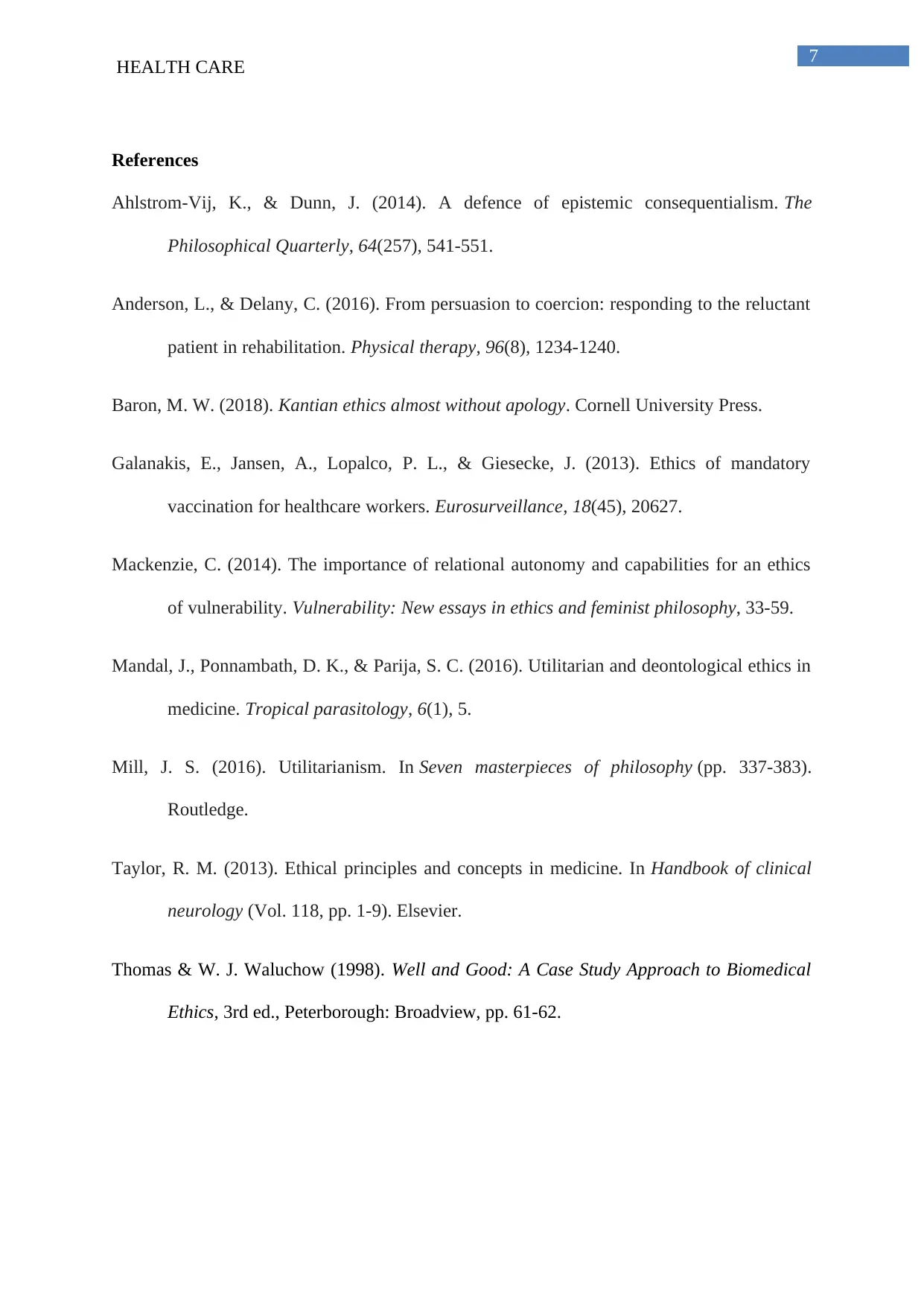
7
HEALTH CARE
References
Ahlstrom-Vij, K., & Dunn, J. (2014). A defence of epistemic consequentialism. The
Philosophical Quarterly, 64(257), 541-551.
Anderson, L., & Delany, C. (2016). From persuasion to coercion: responding to the reluctant
patient in rehabilitation. Physical therapy, 96(8), 1234-1240.
Baron, M. W. (2018). Kantian ethics almost without apology. Cornell University Press.
Galanakis, E., Jansen, A., Lopalco, P. L., & Giesecke, J. (2013). Ethics of mandatory
vaccination for healthcare workers. Eurosurveillance, 18(45), 20627.
Mackenzie, C. (2014). The importance of relational autonomy and capabilities for an ethics
of vulnerability. Vulnerability: New essays in ethics and feminist philosophy, 33-59.
Mandal, J., Ponnambath, D. K., & Parija, S. C. (2016). Utilitarian and deontological ethics in
medicine. Tropical parasitology, 6(1), 5.
Mill, J. S. (2016). Utilitarianism. In Seven masterpieces of philosophy (pp. 337-383).
Routledge.
Taylor, R. M. (2013). Ethical principles and concepts in medicine. In Handbook of clinical
neurology (Vol. 118, pp. 1-9). Elsevier.
Thomas & W. J. Waluchow (1998). Well and Good: A Case Study Approach to Biomedical
Ethics, 3rd ed., Peterborough: Broadview, pp. 61-62.
HEALTH CARE
References
Ahlstrom-Vij, K., & Dunn, J. (2014). A defence of epistemic consequentialism. The
Philosophical Quarterly, 64(257), 541-551.
Anderson, L., & Delany, C. (2016). From persuasion to coercion: responding to the reluctant
patient in rehabilitation. Physical therapy, 96(8), 1234-1240.
Baron, M. W. (2018). Kantian ethics almost without apology. Cornell University Press.
Galanakis, E., Jansen, A., Lopalco, P. L., & Giesecke, J. (2013). Ethics of mandatory
vaccination for healthcare workers. Eurosurveillance, 18(45), 20627.
Mackenzie, C. (2014). The importance of relational autonomy and capabilities for an ethics
of vulnerability. Vulnerability: New essays in ethics and feminist philosophy, 33-59.
Mandal, J., Ponnambath, D. K., & Parija, S. C. (2016). Utilitarian and deontological ethics in
medicine. Tropical parasitology, 6(1), 5.
Mill, J. S. (2016). Utilitarianism. In Seven masterpieces of philosophy (pp. 337-383).
Routledge.
Taylor, R. M. (2013). Ethical principles and concepts in medicine. In Handbook of clinical
neurology (Vol. 118, pp. 1-9). Elsevier.
Thomas & W. J. Waluchow (1998). Well and Good: A Case Study Approach to Biomedical
Ethics, 3rd ed., Peterborough: Broadview, pp. 61-62.
1 out of 8
Your All-in-One AI-Powered Toolkit for Academic Success.
+13062052269
info@desklib.com
Available 24*7 on WhatsApp / Email
![[object Object]](/_next/static/media/star-bottom.7253800d.svg)
Unlock your academic potential
Copyright © 2020–2026 A2Z Services. All Rights Reserved. Developed and managed by ZUCOL.
